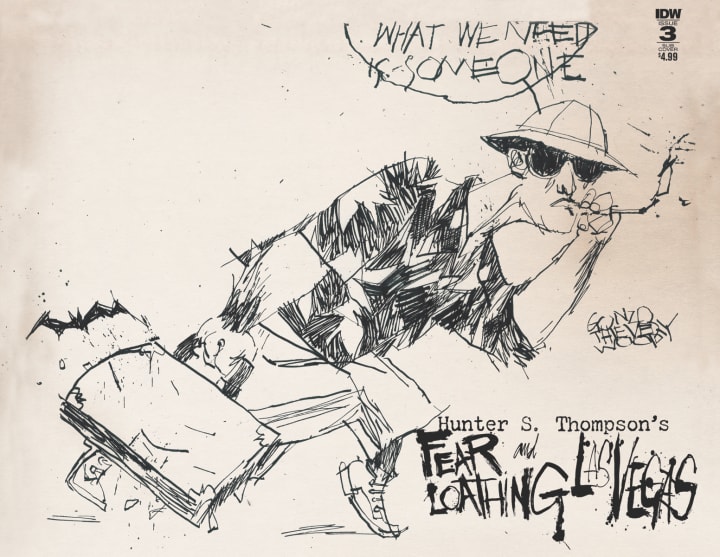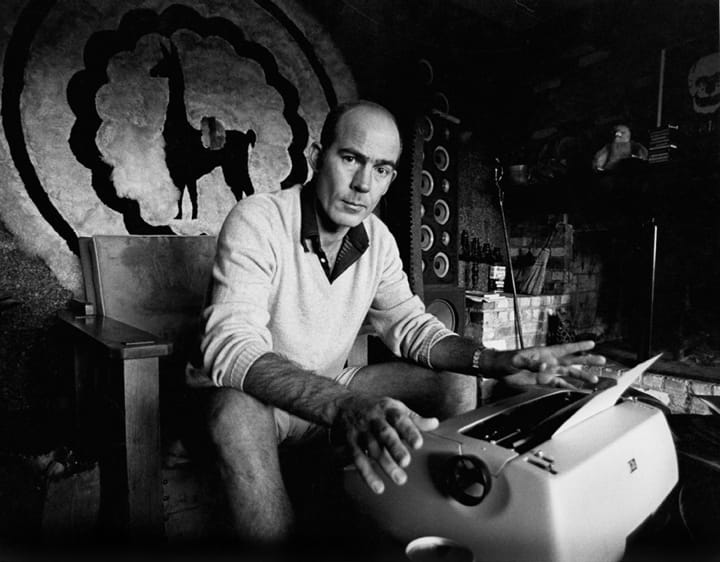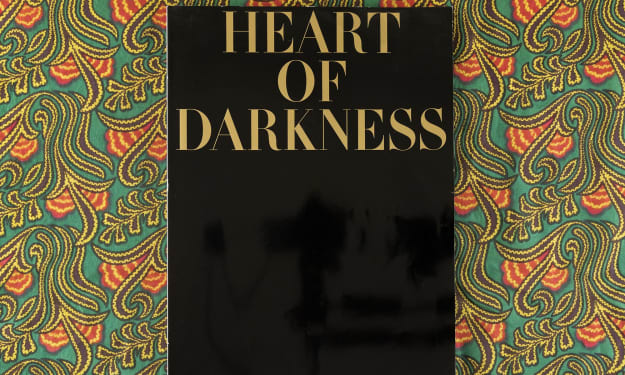"Fear and Loathing in Las Vegas" by Hunter S Thompson
A Reading Experience (Pt.13)

It has been about ten years since I first read the book “Fear and Loathing in Las Vegas” by Hunter S Thompson and when I did read it, I hadn’t actually heard of the film yet. I had only heard of the book because I’d seen the crazy cover in a bookstore and thought it looked fairly interesting. Initially, from the cover, I thought it would be more comedic than psychedelic than it actually was. My first reading experience of it was fairly strange because I’d never really read anything like it before and really, because it was true, that only made it all the more strange as an experience. This book really did manage to change my opinion of the way I looked at journalism. I had never really read any journalism like this before and I had always thought that journalism had to be boring and rigid like something in the Telegraph or the Times. Hunter S Thompson’s Gonzo Journalism made me interested in the way in which I viewed more modern, more exciting journalistic experiences.
My favourite character was obviously our main narrator the journalist himself and this is mostly because of the fact he explains his experience in a brand new, often absurd manner. The character is often considered as one of the most hedonistic men of modern literature and his journey is a symbolic value of America’s changing society in the post-modern period. The 60s to the 80s were the two periods in which this happened and “Fear and Loathing in Las Vegas” seems to take place at the peak of the hedonistic period - the character representing the greatest height of what this means for the American people. An even more modern version of Sal Paradise. The one thing that makes this character so great is not just that he is based on Hunter S Thompson himself, but also because that he completely aware that he is the pinnacle of the hedonist and yet, he chooses to do nothing about it other than take his own life into his own hands. He is the modern man with a hedonistic goal. A modern man in the sense of being ambitious beyond belief, but a hedonist in what he actually wants. Ultimately, this is his greatest fault as well. Even though he is ambitious, his hedonism makes his character somewhat unlikeable to the modern person as well. Though it does not seem to impact his character negatively and makes the narrative more interesting, it also seems like the ‘whatever happens to you is your own fault’ rule applies here. Be that as it may in making the narrative more interesting, it also destroys the way in which we understand the story and this is the fault of the narrator. A lot of the narrative is taken up by the drug-taking and intoxications and this is done on purpose. It presents to us the sheer fault of humanity that no journey through life is ever a straight road without temptation and obstacle. It is always a lumpy road on which we gain new and exciting habits. In all aspects, Hunter S Thompson is the epitome of the man trapped in an ever-changing lonely world, seeking for adventure. He is our generation’s Sal Paradise. He represents all the great adventure that we all seek within ourselves, a discovery of new habits, new places, and the want for adventure in which we have a unique experience in emotions only we can feel.

A great theme you can analyse in the book is the experience of the American lifestyle. The American Dream itself is constantly represented by free expression which includes being able to go anywhere freely and without worries of money or occupations. The book presents this theme as being able to go on a road trip across America with the result of going to a motorcycle race in Las Vegas. There is really no better form of the masculine version of the American Dream in the 1960s-1980s that I have ever found in literature but this. The characters play up to this theme by taking drugs, attending bars and doing things that would be considered part of the freedom of the male in America during that time period. The social context is a heavy influence on how the American Dream plays out but so is the gender of the people involved. This theme is obviously used to echo back to books like “On the Road” and “The Great Gatsby” in which the American Dream is just out of reach. It is basically saying that in a new age, the American Dream is far easier to reach through all the self-obsession, pleasure and hedonism involved. The American Dream becomes a place you don’t have to physically travel to, but in order to prove the point, the characters are going to do both. It impacts how we read the book because really, the only thing the character wants is to be able to travel to a motorcycle race and have a great time. We interpret it as chasing the masculine mid-20th century American Dream because of the various points along the way in which the main character becomes more and more addicted to the certain lifestyle most commonly associated with liberation movements in the soul and self-destruction.
This book means a lot to me because it really did introduce me to a whole world of journalism that I had never ever seen before. It introduced me to the aspect that I could read a journalistic novel and it could actually be an interesting account of philosophical understandings of the changing America rather than just a boring report on something that happened forty years ago. It impacted my latter readings because it was after this that I got into creative nonfiction, like Norman Mailer and Jeff Guinn. Through my re-readings of “Fear and Loathing in Las Vegas” I have also noticed that the book contains various changes in personality that are often attributed to the uses of certain drugs and if you actually look closely at the personality shifts, I’m pretty sure you can tell which drugs they are before the character actually says so. The best thing about the book though will always be its invention of Gonzo Journalism - quite possibly one of the most modern aspects of creative writing in the latter 20th century.

I think far more people should appreciate and read this book as a serious account rather than a novel for edgy teens who feel disassociated with today’s lifestyle and think that hedonism is something to be revered as cool and anti-social. It is a serious invention of one of the great modern ages of new journalism in which personal anecdotes take over and become part of the narrative, quintessentially mixing creative nonfiction with report writing. It has never been done before and we won’t ever see anything like it again. People read this book today for all the wrong reasons. A lot of people want to seem ‘cool’ and ‘edgy’ when reading this book because it makes them feel like they stand out from the crowd. But I would definitely suggest reading this novel for its pretty revolutionary writing style. When I next re-read this book, I want to analyse exactly how the American Dream of the narrator has an impact on the Attorney and what he really thinks of this travelling idea. In this book, he is the Dean Moriarty.
“Too weird to live, too rare to die!”
"Fear and Loathing in Las Vegas" by Hunter S Thompson
About the Creator
Annie Kapur
200K+ Reads on Vocal.
English Lecturer
🎓Literature & Writing (B.A)
🎓Film & Writing (M.A)
🎓Secondary English Education (PgDipEd) (QTS)
📍Birmingham, UK






Comments
There are no comments for this story
Be the first to respond and start the conversation.